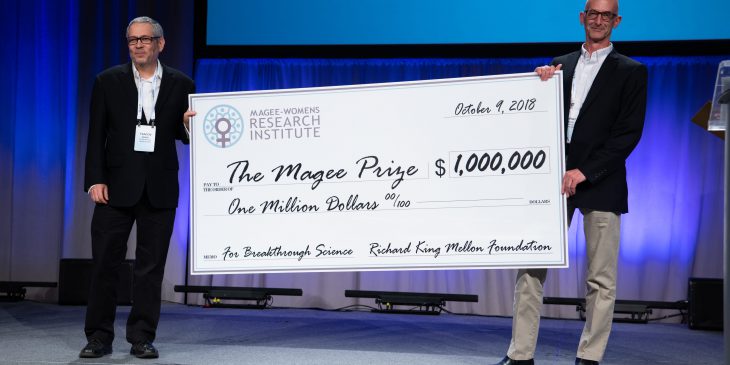An international team of scientists is hot on the trail of deciphering a key cause of one of the most common birth defects, thanks to a boost from an innovative program hosted by the Magee-Womens Research Institute (MWRI) to accelerate transformative research.
At this year’s recent Magee Summit, the original winners of the $1 million Magee Prize shared how the award allowed them to investigate placenta-specific gene mutations that directly cause congenital heart defects.
“I have been working on this project and idea for 20 years,” said Yaacov Barak, Ph.D., associate professor of obstetrics, gynecology and reproductive sciences at MWRI. “It is gratifying to know that persistence pays, and yesterday’s wild ideas may become today’s reality.”
“Congenital” means a health issue present at birth. Congenital heart defect (CHD) is an umbrella term for an array of conditions that involve an abnormal structure in the heart resulting in abnormal blood flow management and, consequently, insufficient oxygen delivery to the entire body. Together, CHDs are the most common birth defects, affecting approximately 1 out of every 140 babies. Although there are treatments for CHD, primarily surgical, there is no cure. Some forms of CHD can be lethal during fetal development or shortly after birth if not diagnosed early. Therefore, it is crucial to diagnose CHD as early as possible during pregnancy to prevent fetal or newborn deaths. However, the exact cause of a majority of CHDs is still unknown.
“The research program is innovative and paradigm-changing. It’s hard to get funding for science that goes against conventional wisdom, so this is a great honor to propel our collective work forward,” said Henry Sucov, Ph.D., professor at the Medical University of South Carolina, one of Dr. Barak’s research partners.
By developing a novel method for restricting gene expression in mice to only the placenta or only the fetus, they were able to sort out an array of gene mutations that cause fetal heart defects strictly through their action in the placenta.
Dr. Barak’s group followed up on their earlier findings that implicated placental defects as the primary driver of severe heart malformations and mid-pregnancy death in embryos deficient for the transcription factor retinoid X Receptor alpha (Rxra). With the Magee Prize funding, the group developed a new mouse model in which Rxra expression is reduced, rather than entirely deficient, only in the placenta. This mutation delayed death to the last stages of pregnancy and birth, demonstrating that the severity of the heart defects is directly proportional to the degree of gene activity in the placenta, and aligning more closely with the timing of CHDs in humans.
Myriam Hemberger, Ph.D., professor at the University of Calgary and another partner on the research, investigated the potential contribution of new genes to placental origins of heart defects. Using innovative genetic technology, her group found that depletion of the Atp11a gene in the placenta led to lethal in utero CHD, whereas heart defects in another candidate mutant, SSr2, were independent of its placental activity. Her group further established an innovative stem cell culture system that demonstrates clear effects of placental secretions on heart development and should enable scientists to track down the factors that mediate these effects.
The ultimate goal of this research is to detect gene defects during early pregnancy to enable in utero gene therapy that can prevent CHD and allow normal fetal development. The Magee Prize enabled the team to gather enough data to submit a joint National Institutes of Health grant proposal this year to further their exploration on the topic.
The $1 Million Magee Prize, funded by the Richard King Mellon Foundation, aims to promote scientific collaborations among international and MWRI researchers on innovative projects focusing on women’s health and reproductive biology.
At 2021 Magee-Womens Summit, three finalist teams were chosen to present their proposals for the Magee Prize. The winning proposal was “Vaginal Stem Cells: The Missing Link in Vaginal Reconstruction,” led by Pamela Moalli, M.D., Ph.D. and Kyle Orwig, Ph.D, both of MWRI and Pitt, and Caroline Gargett, Ph.D., Monash University. They aim to use high resolution sequencing to identify new biomaterials for vaginal reconstruction for women who are born without a vagina or have damaged vaginas due to injuries.
Kien Tran is Ph.D. candidate in the Molecular Genetics and Developmental Biology Graduate Program at the University of Pittsburgh School of Medicine. She is participating in the UPMC Science Writing Mentorship Program.








